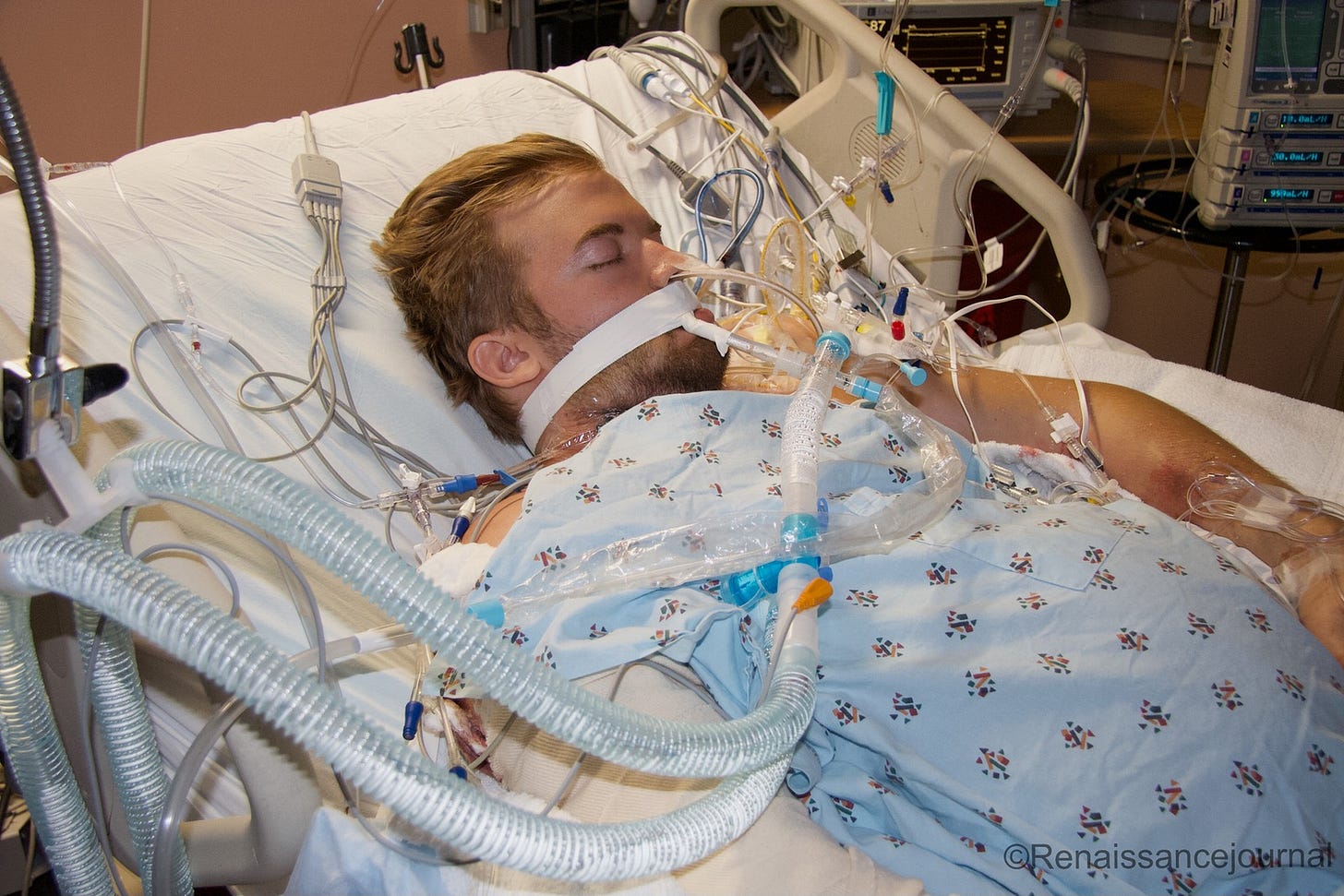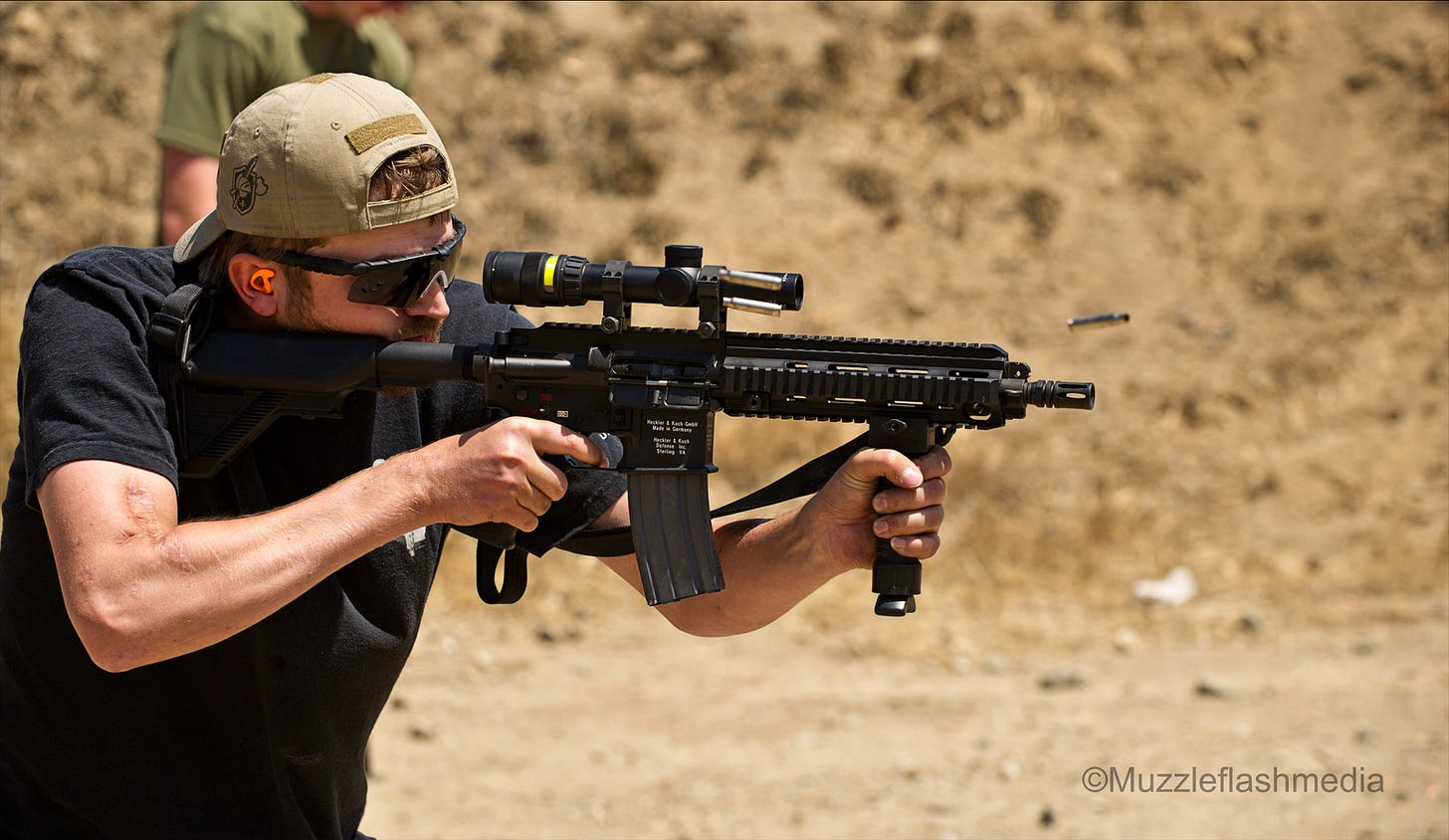July 11th, 2006 is a demarcation date in my life and what I'd like to highlight is how shooting plays a significant role in my journey from a hospital bed to my current state and hopefully my future. I'm always happy to discuss my various experiences with anyone that asked, but I dislike volunteering information about my accident and challenges because I don't want the pity. I've had friends that suggested it would be therapeutic for me to write about and might help encourage someone else. What finally pushed me over the edge was a post by James Yeager on Instagram sharing a story of a cop who lost part of his trigger finger. He was very discouraged but had some friends push and support him to persevere and figure out how to get back to enjoying the hobby. I thought it was an encouraging story, and that was the final push to force me to write this story in the hope that it encourages someone else and supports them because I certainly had lots of support over the years.
To set this story up requires a bit of background. I was 22, and I was living the life; I was an apprentice machinist in the gun industry, enjoying my job, riding a great motorcycle heading to a friend's house to play poker. Then suddenly, an SUV stopped in the middle of a single-lane turn for no reason. I was already leaned over for the turn going 30mph (motorcycles don't like stopping in turns), so I had to decide if I wanted to lay it down and maybe run into the back of the SUV or try to go around the shoulder. I chose the shoulder, not realizing the construction around the site had left a bunch of debris. The debris grabbed my tyres, pitched me off the bike into the concrete barrier, bounced off that into the handlebar of my motorcycles, and then slid on the asphalt on my face for about 50 ft before finally grinding to a halt (don't worry, I was wearing a full helmet so my ugly visage was protected from further disfigurement). As I tried to understand what happened, I flipped myself over, realizing I couldn't use my right arm, used my left arm to undo my helmet, and saw blood pouring out of my right arm. I couldn't feel my legs, and I knew I was pretty badly hurt. I had some medical training from some shooting classes and knew that staying calm was vital to not accelerating my blood loss. Fortunately, a Good Samaritan stopped behind me, called 911 and my parents. Everyone arrived, but the one thing I carried about was making sure the CHP officer knew I was a licensed concealed carry holder and I was carrying a gun. In Southern California, concealed handgun licenses are rare, and I didn't want my weapon going to evidence lock up (it was a Ted Yost 1911, priorities!). I'm told I remained conscious for the next 8 minutes until I reached the nearby trauma center, but I can't remember that part. After I stayed coherent long enough to give my dad's cell number and protect my gun, my brain decided it didn't need to remember anything else, or maybe that was hitting my head into a concrete barrier?
Over the next 24hrs, I flatlined a few times. When my parents arrived, the surgeons told them I had two 100% fatal injuries, and they had never seen a patient live from one, let alone two. The surgeons' promised my parents that as long as I was fighting for my life, so were they. Thanks to some very talented medical staff with a healthy dose of divine influence(according to one of the surgeons), they managed to keep me alive.
There is a lot more medical nonsense, but a short summary of major injuries:
1. Fractured my back and damaged nerves
2. Stage 5 liver lacerations
3. Right kidney was ripped from everything it was attached to and was floating in my abdominal cavity when they unzipped me
4. Massive internal bleeding
5. Right arm compound fracture that sliced all three nerves in
6. Compressed my neck, severely damaging the nerves in my left arm as well.
To say I had a few problems going on is a bit of an understatement. I was brought out of a medically induced coma; I couldn't talk due to a breathing tube being down my throat for eight days, and in between hallucinations from the drugs and being unable to speak, I had to be alone with my thoughts. I don't know how I remember this so clearly. Still, at this point, I didn't know the extent of my injuries beyond it was terrible, and I couldn't talk with anyone to try to understand it better. Through the fog, I sensed a tipping point, do I continue to fight to stay alive, or is the unknown of my injuries too scary that it was better to give up and go home. I thought back on the totality of my knowledge, my faith, the wisdom I had gained from being a voracious reader, life experience, family, etc. While my biggest fear was not walking again, I decided the right decision was fighting to stay alive.
Several weeks later and I finally got moved off ICU, and friends could visit me. While I still couldn't walk yet, and my right hand/arm was useless, I had managed to get my mind to start rebuilding the pathways, and I could move my left hand a bit. One of my friends from work came to visit and brought a blue gun with a weapon light on it for physical therapy to exercise my hand. The nurses freaked out at first, but after given context, they relaxed; this started me down the path of using my shooting hobby as rehabilitation. Several more weeks later, I finally relearned how to walk, how to brush my teeth(left-handed!), feed myself, etc., and was finally released from the hospital. Even though I was/am still relatively physically broken, I knew I wanted to go shooting. I was determined to figure out just how bad I had become and start to figure out how I could get better.
It's hard to describe the broad positive effect shooting and the surrounding culture has had on my life. Somehow, even though I didn't grow up around guns, I was fascinated by them. I started working in the gun industry at 19, and that started me down the path of shooting being work, hobby, and how I ended up meeting great people that became dear friends. I am not some high-speed, low drag operator, but I started taking a decent number of classes and training regularly (ammo was a lot cheaper then). I shot a Kimber LW commander so much I cracked the frame(to their credit, they replaced it). As I wandered deeper down the path, I was introduced to several people through work, and being the young kid I was, I just listened and tried to soak up the knowledge. I became a died in the wool 1911 .45 ACP devote (Two World Wars) and managed to meet some of the great 1911 smiths of the time and was fortunate to end up having a custom gov Colt 1911 built by Ted Yost's shop for me. So when I got out of the hospital, my standard carry/primary gun was a 5" gov 1911, and I didn't know how bad I would be, but I was determined to go. I had done a few training classes where I had to shoot off-handed, but I was still nervous when I went to the range for the first time with my friends. I honestly don't remember many details about the trip, but my friend swears that I managed to shoot a good group with my one hand that sort of worked (my left) while being right eye dominant. It was encouraging enough that I was determined to figure out how to relearn how to shoot. My goal was always to be better than I was pre-accident; I also was cognizant of my limitations, I tried not to get too high or too low. The other key lesson for me was using custom guns; I realized a gun's factory features did not need to be the limiting factor. With the help of some friends, I immediately began trying to find the best gun for my particular capabilities at the time.
Over the years, I've ended up trying a lot of different systems, some were the right for the time, and others just didn't fit. It was not easy; nothing about this was easy. It caused immense pain, frustration with not being close to as good as I used to be, and all the other natural reactions from a severe injury and trying to rehab. I also faced dealing with disabilities that I didn't know if they would get better or not. For a while, my reality was I could only shoot with my left hand. Eventually, I could sort of use my right hand as support. The next step was shooting right-handed and then starting to shoot carbines again. I had a goal of shooting 3 gun again, and it took some years to get to that first match, but with the great support of my friends, I was able to do it. I was horrible and had to shoot part of the match left-handed part right-handed (the nerve damage in my right hand couldn't take the abuse). Now, almost 15 years later, I'm still working to get back to the skill level I had before. I've run a bunch of different gear and guns, always trying to figure out how I can make these mechanical objects adapt better to my bio-mechanical difficulties. My encouragement is not to be afraid of modifying guns so you can get out and enjoy your hobby again. Ask your friends, gunsmiths, heck maybe some of the things I've tried may give you ideas. It is not an easy road. I have my good days and bad, but overall the journey to relearning how to shoot several different times and counting as my knowledge and injuries change has/continues to be an essential part of my physical and mental healing.
For those interested, I will be writing follow on pieces describing specific guns/gear I used at different times and what injuries I was trying to adapt for with the various setups.
This photo was taken by a friend about 6 years after the accident
*follow all local state and federal laws because we do*





Truly terrific read Trevor. I was reminded of my accident and rehabilitation. With the support & faith of all those around & above me, I too was able to jump back on a dirt bike [with some new Titanium inside me] and continue down this amazing & blessed life. And ride on. Be safe, shoot straight brother.
Such a great story of determination and faith! What an ugly accident!!
Great read and look forward to more!!